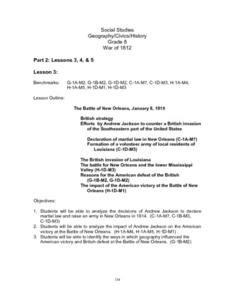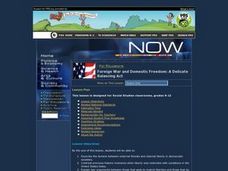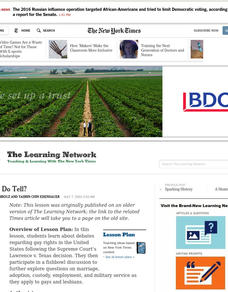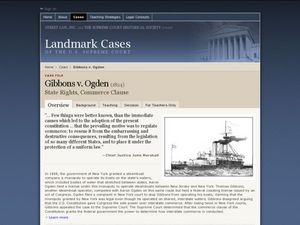Curated OER
What is Government?
Students explore values that unite Americans. In this government lesson, students recall the symbols of America and discuss how to create a "Classroom Constitution." Students form rules and write their own Constitution.
Curated OER
Twelve Angry Men: Trial by Jury as a Right and as a Political Institution
Young scholars explore the constitutional guarantee of the right to trial by jury. In this U. S. Constitution lesson, students read or view Twelve Angry Men and respond to discussion questions regarding the jury. Young scholars examine...
Curated OER
War of 1812
Eighth graders locate the major land forms and bodies of water on a map of Louisiana. In groups, they discuss the role of the Mississippi River in the Battle of New Orleans and how land and water affect the outcome of battles. To end...
Curated OER
Can I Have a Jury Trial?
Students examine the difference between a jury trial and a bench trial. They discuss any protections that the Indiana and United States Constitution offers its citizens. They use the internet to research any current press of jury trials.
Curated OER
Foreign War and Domestic Freedom: A Delicate Balancing Act
Students investigate civil liberties in the U.S. They watch and discuss a PowerPoint presentation, conduct research on an event from a timeline, complete a worksheet, take an ideology quiz, and conduct a debate.
Curated OER
Do Ask? Do Tell?
Students explore debates regarding gay rights following the Supreme Court's Lawrence v. Texas decision. They participate in a fishbowl discussion, exploring questions on marriage, adoption, custody, employment, and military service.
Curated OER
Gibbons v. Ogden (1824)
Students examine state rights and the commerce clause. In this Supreme Court lesson, students examine primary documents from Gibbons v. Ogden and discuss the implications of the decision.
Curated OER
Liberty Vs. Safety: an American Dilemma
Students study the process of consensus and the value of studying history as we try to craft a more perfect society. They examine President Franklin D. Roosevelt's decision to incarcerate Japanese Americans in the Western United States,...
Curated OER
Justice Demands an End to Segregation, But it Does Not End
Students define human rights and describe how it applies to politics, economics and cultural rights. As a class, they watch a video how the Constitution was made and discuss its purpose. In groups, they present information to the class...
Curated OER
The ADA, the Supreme Court, and Self-Advocacy
Students study the role the Supreme Court plays in laws and decisions that affect individuals with disabilities and examine the policies of the American with Disabilities Act. They draw parallels between policies enacted by the ADA and...
Curated OER
Photographs of the 369th Infantry and African Americans during World War I
Students engage in a discussion regarding images of war we see, how quickly do we see them, and how they affect us? They view and analyze war photographs taken during World War I.
Curated OER
Activism and Social Reform in America from 1800-1850
Students discuss idea of social status, examine antebellum social reform movements, and compare and contrast experiences of activists who sought to improve workers' lives, end slavery, reform immigration laws, and establish voting rights...
Curated OER
Judges in the Classroom
Students define the legal meaning of juvenile and identify various ways to treat young offenders. They identify the current philosophy of the Utah juvenile justice system using a true/false worksheet and discussion format.
Curated OER
1856-1865: Abolitionists and the Civil War
Students explore the concept of philanthropy. In this abolition lesson, students watch "Uncle Tom's Cabin" and discuss the philanthropic acts they witnessed in the film. Students also complete an activity that requires them to determine...
Curated OER
Reviewing the Election Process by NOW Classroom for PBS
Students take a closer look at presidential elections. In this election process instructional activity, students discuss the roles of the primary, caucus, polls, Electoral College, delegates, and lobbyists in the process. Students then...
Curated OER
Voting
Students investigate voter participation in the U.S. They watch and discuss a Bill Moyers video, complete a handout, and develop a plan to help a community overcome obstacles to voter participation.
Curated OER
Term Limits: When is Enough?
Students discuss the issue of term limits in the executive and legislative branches. They research the issue and create a pros and cons chart with the various opinions on Congressional term limits. In addition, they explore the 22nd...
Curated OER
Separation of Powers
Students examine the roles of each of the branches of U.S. government. In this checks and balances lesson, students watch Discovery video segments and discuss the concept of federalism as they create a school-wide policy for government...
Curated OER
The United States Flag
Students discover the meaning and symbolism behind the American flag. In this lesson on National symbols, students design a flag for their school, explain the symbolism they used, and distinguish the elements that constitute the US Flag....
Curated OER
Learning to Respect Each Other
Discover how important Martin Luther King Jr. is to our society. In this civil rights lesson, investigate how Dr. King was an advocate for nonviolence and how he fought for civil rights for all Americans. Read and analyze Dr. King's "I...
Curated OER
Mapp v. Ohio (1961)
Students examine warrantless searches and due process. In this Supreme Court lesson, students examine primary documents from Mapp v. Ohio and discuss the implications of the decision.
Curated OER
Individual Rights - The Right To Equal Protection
Students examine the concepts of equal protection, discrimination, affirmative action, and racial profiling. They analyze the Equal Protection Clause, participate in a mock trial, and discuss the different parts of the trial.
Curated OER
Basic Workplace Rights
Young scholars study basic workplace rights and the limits of those rights. They determine how many of the rights guaranteed in the Constitution only regulate governmental actions, not private actions. They examine the concept of at-will...
Curated OER
Child Abuse and the Trial Process
Students identify the elements of child abuse and neglect. Using this information, they relate it to the laws in their home state. They read scenerios and ask questions to determine if child abuse is present. They review the trial...

























